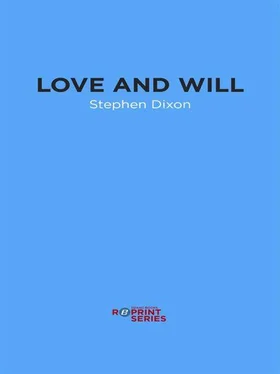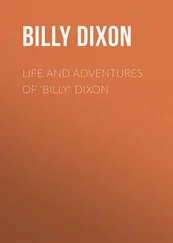Stephen Dixon - Love and Will - Twenty Stories
Здесь есть возможность читать онлайн «Stephen Dixon - Love and Will - Twenty Stories» весь текст электронной книги совершенно бесплатно (целиком полную версию без сокращений). В некоторых случаях можно слушать аудио, скачать через торрент в формате fb2 и присутствует краткое содержание. Год выпуска: 2013, Издательство: Dzanc Books, Жанр: Современная проза, на английском языке. Описание произведения, (предисловие) а так же отзывы посетителей доступны на портале библиотеки ЛибКат.
- Название:Love and Will: Twenty Stories
- Автор:
- Издательство:Dzanc Books
- Жанр:
- Год:2013
- ISBN:нет данных
- Рейтинг книги:4 / 5. Голосов: 1
-
Избранное:Добавить в избранное
- Отзывы:
-
Ваша оценка:
- 80
- 1
- 2
- 3
- 4
- 5
Love and Will: Twenty Stories: краткое содержание, описание и аннотация
Предлагаем к чтению аннотацию, описание, краткое содержание или предисловие (зависит от того, что написал сам автор книги «Love and Will: Twenty Stories»). Если вы не нашли необходимую информацию о книге — напишите в комментариях, мы постараемся отыскать её.
Love and Will: Twenty Stories — читать онлайн бесплатно полную книгу (весь текст) целиком
Ниже представлен текст книги, разбитый по страницам. Система сохранения места последней прочитанной страницы, позволяет с удобством читать онлайн бесплатно книгу «Love and Will: Twenty Stories», без необходимости каждый раз заново искать на чём Вы остановились. Поставьте закладку, и сможете в любой момент перейти на страницу, на которой закончили чтение.
Интервал:
Закладка:
No thanks, she said.
Thank you but no, she said.
No, I don’t really think I could read it right now, she said, But thanks.
No, really, please, though you have my thanks for offering me another story, I doubt I could read one more, she says.
No, I’m sorry, Willy, really, but I can’t, and not because I don’t want to or because I couldn’t bear to read another of your stories, but because my eyes are too tired to, Magna says, And that’s the honest truth.
No, really, it’s impossible, out of the question, and not because I’m too tired to or my eyes are too damaged to or any of those why-I-can’t-read-another-of-Willy’s-stories stories, Magna says, But because I just don’t, won’t and will probably not — not probably not — I will never again want to read one of them, plain as that, which I’m not a bit sorry to say so, and you want to know why?
Why you’re not a bit sorry to say so? I say.
Why I don’t want to read another of your stories, she says, — You want to know why?
No, I say.
No I don’t, I say.
No really, thanks, but spare me, I say.
I don’t know — I think I do but then again I think I don’t, I say.
Yes, I think I do, I say, Why?
All right, I say, Why?
Why? I say.
Yes, I say, I really would like to know why. Why?
You bet I want to know why, I say.
Why can’t you read another one of my stories? I say. Just tell me, give me one good reason, give me even half a good reason, because what else do you have to do or do you do? Other than reading my stories you do nothing but sit in a chair and sleep in bed or sit up in bed and sleep in a chair, so you’re in fact lucky I give you my stories to read, you’re in fact lucky I keep writing stories which you’re then lucky I give you them to read, because if I stopped writing them you of course wouldn’t have any more to read, and then what else would you have to do but sit and sleep, in bed or in a chair?
I wish I could read one more, Willy, she said, But I busted my glasses today and don’t have another pair.
All you do is give excuses, I said, Other than for sitting in bed and sleeping in a chair and vice versa, and of course reading my stories, in bed or in a chair.
I’d love to read your story, she said, But not outside. It’s dark now, can’t you see? Actually, I don’t want to read your story and it isn’t dark, and don’t ask me why I made up such a ridiculous excuse when you can see from here it’s still very much light out, or said I’d ever want to read your story, if I did, though that’s all I’m going to say of it, now and for all time about your story and giving excuses for not reading them, even if that last excuse is way less than insufficient for you.
I wish I could read another of your stories, Magna said. In fact I wish I could read a couple-hundred more. But you won’t believe this — I can’t see. I suddenly lost all my sight.
I’d love more than anything in the world to read another of your stories, Willy, Magna says, But you won’t believe this in a hundred thousand years: I can’t see now and never could.
She’s still reading my stories, pages are still being turned, grunts, groans, laughs, still being made, it’s still light out, sunny and bright, and she’s still sitting in the chaise longue on the back porch of this cottage overlooking the ocean — the top floor of the cottage does, all she can see from the porch in that direction are the trees obscuring the ocean — one of the cats in her lap, other two cats under the chaise longue — reading, reading my stories — she is, the cats if they’re still where they were when I last saw them are probably still sleeping — while I try to write another story so she’ll have a fifth one of mine to read in the order I wrote them, one in May, two in June, one in July, all in the same year, and this one if I finish it on time written the same day I finished the last page of the fourth story, and now of a length where I can at last say — well, maybe I could have said it two to three pages back — that if I have to stop because she’s opening the screen door to come upstairs to tell me what she thinks of my four stories, it’ll at least be, if not finished, then long enough to be considered in some circles a story, and maybe finished even if I stop in the middle of a sentence or anywhere but the end of the sentence in a place where to many readers in some circles if not most readers in many circles to every single reader in every circle, a story that’s unfinished, or rather, a story that perhaps to some or all readers is unfinished but to me is—
I stopped writing that last sentence because it was getting confusing. Not Getting: it was confusing. Is confusing, so long as I still have it on this page. But what I meant to say in the sentence or two before the one before the last one was that no matter where I stop, the story will be finished, since that’s the kind of story I’ve decided this one will be: a story that will be finished, if I don’t finish it before then with a period at the end of a final paragraph, the second she opens the screen door to come upstairs with the other four stories to talk about them. How do I know she’ll come upstairs with the other stories and will want to talk about them? That she’ll even open the screen door? That she’ll even finish the stories? That she’ll even finish one of the pages of one of the stories or even the first paragraph or line or word of one of the stories? That she’ll even — uh oh, I just heard the screen door open. I know I said I’d stop the second she opened the door to come upstairs, but I’m not sure she was the one who opened the door. It could be one of her cats. Each one knows how to open the screen door if it’s not locked. They open the screen door, and have opened it this way hundreds of times before, by pushing one paw between the door and jamb till they get
The Last
I want to throw the whole thing into the river. I think I’ve already said that. Or I’ve done that. Which is it? Me mind, me mind. Been working at this so long I forget what I do, why I do it, when I did it. Let me see, when was it? I was, well there I was, I mean it was, oh forget it. I’ll never remember, but give it one more shot. I had this thing, right, this thing and threw it into the river, there it was, floating for a while, sank after a while, so be it. But what was that thing? I thought I said. Let me think. No you didn’t. It was a thing, right. It was it. It was this. I mean — looking over to where this thing is or was — it isn’t there so it was my manuscript. That’s what it was. There. To be exact: my biggest manuscript. That’s exactly what it was. Threw the damn thing into the river. Wrote about it, wrote it, wrote what I did with it after I wrote it: river, manuscript. Wrote that I was finished with it, had enough, couldn’t go on with it, that’s what I felt, that’s what I did, threw it into the river, the whole thing, so what more’s to be said about it, right? I guess nothing, so I’ll sign off.
But now I’ve nothing to do. It’s like a child who’s upped and gone away from home, just left, left home for good, deserted the hearth, said to its daddy, me, I’m leaving for good, said to its mommy, me, I’ve had it here forever, said to its parents, me, because I did it, I’m responsible, I gave birth to it, I suckled it, I provided the egg and sperm and place to grow, I nurtured it, I brought it up, I got its food and fed its face, I took care of it when it was sick, I cut its cord with my teeth, bit through it and sewed it up, I read it its first words, taught it how to talk and walk, held it against my chest, held it to my breast, I wiped its ass every day and night eight-ten times a day and threw out its shit, I let it piss on my head and toes, I let it pull my nose and lobes, I held and kissed it, I was held and kissed by it, I am lost without it, I walk around town wondering where it is and what I’ll do for the rest of my life without it, I, well, I can’t, well I just can’t live without it I sometimes think.
Читать дальшеИнтервал:
Закладка:
Похожие книги на «Love and Will: Twenty Stories»
Представляем Вашему вниманию похожие книги на «Love and Will: Twenty Stories» списком для выбора. Мы отобрали схожую по названию и смыслу литературу в надежде предоставить читателям больше вариантов отыскать новые, интересные, ещё непрочитанные произведения.
Обсуждение, отзывы о книге «Love and Will: Twenty Stories» и просто собственные мнения читателей. Оставьте ваши комментарии, напишите, что Вы думаете о произведении, его смысле или главных героях. Укажите что конкретно понравилось, а что нет, и почему Вы так считаете.












